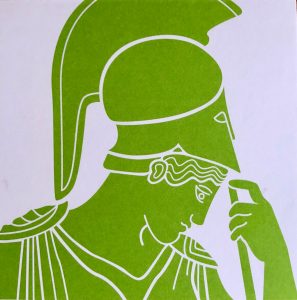 Counting back from August to April: I hooded another PhD student, I attended my son’s college Commencement, and I received a Faculty Doctoral Mentoring award. So I’m thinking about mentoring as I’m kicking off a new academic year. The ancient Greeks saw a divine component in such guidance. Indeed, the word mentor comes from Athena’s alter ego (Mentor) in The Odyssey–a genderbending guise she assumes to guide Telemachus toward his father and his own maturation.
Counting back from August to April: I hooded another PhD student, I attended my son’s college Commencement, and I received a Faculty Doctoral Mentoring award. So I’m thinking about mentoring as I’m kicking off a new academic year. The ancient Greeks saw a divine component in such guidance. Indeed, the word mentor comes from Athena’s alter ego (Mentor) in The Odyssey–a genderbending guise she assumes to guide Telemachus toward his father and his own maturation.
As mere humans, we cannot approach the mythic proportions of Athena’s arts of mentoring. We can’t even come close. The ancient goddess of wisdom, war, and handicraft was denizen of Olympus, not a college or university. Still, we earthly academic mentors can fathom a few things from the epic account of Athena’s role as Mentor. It can inspire us to fulfill our parts in bringing our students and their work into their future incarnations.
- Assuming the appearance of Odysseus’s male friend Mentor, Athena reminds us that mentoring means crossing boundaries. When we mentor, we cross over into the role of offering professional guidance–assuming a level of authority we grow into as
 we learn from our students and recall our own mentors’ counsel. Sometimes this authority can feel more guise than credential, but it becomes more natural the more we take on this role.
we learn from our students and recall our own mentors’ counsel. Sometimes this authority can feel more guise than credential, but it becomes more natural the more we take on this role. - As a goddess of warfare as well as good counsel, Athena reminds us that mentoring is sometimes a struggle that both parties must pursue. Some mentees will thrive on their mentors’ feedback, while others will resist it. Some students will do both. Each student forms a unique relationship with mentor, work, and goal. The mentor must deploy an arsenal of tactics to help the mentee battle through obstacles. A mentee may leave a mentor, but a true mentor will never leave a mentee.
- Time and time again, Athena in her role as Mentor “urged him on with winging words” so that Telemachus had the confidence and courage to embark and succeed. As Gregory Nagy put it, Athena as Mentor “intervenes in his life, which is very misdirected at the time, when he’s not sure about anything.” A mentor intervenes by transforming doubt into action. A mentor intervenes by opening possibilities. A mentor intervenes through advocacy.
- A mentor must be strong, offering seasoned shoulders to those who will come after. A mentor does not detour the mentee’s path by reversing the relationship, by asking the mentee to lend support to the mentor’s own struggles. Standing on the shoulders that lifted them, true mentors offer “winging words” that propel mentees into their futures.The next epics belong to them.
-MB
Sources:
Notepad design drawn from “The Pensive Athena” (Acropolis Museum, Athens)
Homer, The Odyssey, trans. Robert Fagles (Viking, 1996)
Marsha Bryant, “Graduate Mentoring: A Poetics” (2009).
B.R.J. O’Donnell. “The Millennia-Old Model of Mentorship.” The Atlantic (Oct. 13, 2017)